|
|
|
Sort Order |
|
|
|
Items / Page
|
|
|
|
|
|
|
| Srl | Item |
| 1 |
ID:
160849
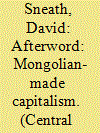

|
|
|
|
|
| Summary/Abstract |
Oligarchy (oligarhi) has become a well-worn Mongolian term for describing the social order. Real power and wealth is now said to be monopolized by a small number of super-elite families. The roots of this oligarchic capitalism lie in the process by which ownership was acquired and concentrated so as to take control of companies, rather than simply making profitable investments. The emergent form resembles Thomas Piketty's notion of ‘patrimonial capitalism’, a political economy dominated by inherited private capital, rather than the wealth created by entrepreneurship or innovation. Mongolian capitalism can also be seen as patrimonial in another sense. Its roots lie in the opportunistic struggle over a form of national patrimony: the enterprises and resources inherited from the previous political economy. The new proprietorial class already appears faintly dynastic, and presently there seem to be no barriers to the transmission of wealth to the next generation of super-rich.
|
|
|
|
|
|
|
|
|
|
|
|
|
|
|
|
| 2 |
ID:
139444
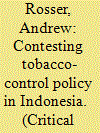

|
|
|
|
|
| Summary/Abstract |
Over the past decade and a half, the Indonesian government has progressed fitfully and inconsistently toward a stricter tobacco-control policy regime, albeit without much impact on the country's worsening tobacco epidemic. This article explains this pattern of reform in terms of the unequal but changing relationship of power between tobacco companies and tobacco farmers, on the one hand, and tobacco-control advocates based in NGOs, health professional organizations, universities, and international organizations, on the other. The first of these coalitions has had greater structural leverage, better political connections, stronger organizational capacity, greater ability to mobilize popular forces, and more capacity to cultivate a positive public image. But the second coalition has been able to exercise some influence over policy because of changes wrought by democratization. In this analysis, the author engages with the literatures on (1) Indonesia's political economy in the post–New Order period and (2) the politics of tobacco control in developing countries. With regard to the former, the author argues that we need to give greater attention to the role of actors previously excluded from the policy-making process than is currently the case. With regard to the latter, the author contends that more focus is needed on domestic actors and political institutions in shaping tobacco-control policy. Looking to the future, the author suggests that further progress in Indonesia's tobacco-control policies will be contingent upon an ongoing process of struggle; however, there are signs that the tide is turning in favor of the second coalition.
|
|
|
|
|
|
|
|
|
|
|
|
|
|
|
|
| 3 |
ID:
097825
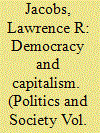

|
|
|
| 4 |
ID:
071700
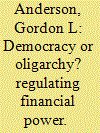

|
|
|
| 5 |
ID:
186385
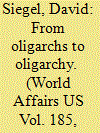

|
|
|
|
|
| Summary/Abstract |
Drawing heavily on theories about Russia's informal politics, American sanctions were designed to change Russian foreign policy by exploiting political conflict among oligarchs and the state elite; however, after nearly eight years of sanctions, Russian elites seem more united than ever. I propose that Russia's oligarchs—the ruthless self-interested economic elite in Russia's informal political system—might sometimes act as a cohesive oligarchy, particularly when their wealth is threatened from external rather than domestic sources, as has been the case under Western sanctions. Through an in-depth case study on the design and outcome of sanctions, this article seeks to develop a more dynamic theory of Russia's informal politics and explain the apparent cohesion among state and economic elites since 2014 as the result of a politics of wealth defense induced by Western sanctions.
|
|
|
|
|
|
|
|
|
|
|
|
|
|
|
|
| 6 |
ID:
141723
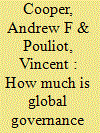

|
|
|
|
|
| Summary/Abstract |
Is the G20 transforming global governance, or does it reinforce the status quo? In this article we argue that as innovative as some diplomatic practices of the G20 may be, we should not overstate their potential impact. More specifically, we show that G20 diplomacy often reproduces many oligarchic tendencies in global governance, while also relaxing club dynamics in some ways. On the one hand, the G20 has more inductees who operate along new rules of the game and under a new multilateral ethos of difference. But, on the other hand, the G20 still comprises self-appointed rulers, with arbitrary rules of membership and many processes of cooption and discipline. In overall terms, approaching G20 diplomacy from a practice perspective not only provides us with the necessary analytical granularity to tell the old from the new, it also sheds different light on the dialectics of stability and change on the world stage. Practices are processes and as such they are always subject to evolutionary change. However, because of their structuring effects, diplomatic practices also tend to inhibit global transformation and reproduce the existing order.
|
|
|
|
|
|
|
|
|
|
|
|
|
|
|
|
| 7 |
ID:
155094


|
|
|
|
|
| Summary/Abstract |
Few countries have been burdened with such great expectations as Indonesia and have failed to meet them in the ways expected. Economists have persistently predicted that Indonesia could be an economic giant in the region, challenging the state-led economies of Northeast Asia on the basis of free market policies. After the fall of Soeharto in 1998, pluralist political scientists saw Indonesia as a shining light for democratic transition. More recently, Indonesia has been hailed as a model for how democracy might work in a Muslim-majority country. Yet, we are still waiting for a new economic giant to emerge while democracy has not been able to resolve growing concentration of power and wealth in Indonesian society or to stem growing social resentment. Reactionary Islamic populism has often threatened Indonesia's reputation for religious moderation. Why have so many analysts had such great expectations of Indonesia and how have they explained the seeming disappointments? We propose that the institutions of markets and democracy are not a good starting point for explaining things. The problem lies in the way economic and social power is constructed and in the interests of powerful oligarchies that continue to dominate the political and economic landscape.
|
|
|
|
|
|
|
|
|
|
|
|
|
|
|
|
| 8 |
ID:
125081
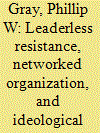

|
|
|
|
|
| Publication |
2013.
|
| Summary/Abstract |
This article examines various forms of "new terrorism," specifically the structure of "leaderless resistance," in connection with Robert Michels' idea of the "iron law of oligarchy." It is usually argued that "leaderless resistance" movements lack some of the typical obstacles of terrorist (and other) organizations, given their non-hierarchical and comparatively fluid natures. However, a new form of oligarchy develops in this type of movement, located in the propagation of key ideological concepts/arguments/symbols, the assigning of target preferences, and the elevation or demotion of others within the movement broadly. Rather than oligarchy forming via the material assets of organizations, an "ideational" oligarchy is created that shapes the goals of leaderless resistance movements: those leaders who are already established, and who control the means of communicating the movement's ideas to the widest audience, will impede the growth of groups and individuals within the movement that attempt to supplant their role. This article will use the examples of certain eco-terror groups (the Animal Liberation Front and the Earth Liberation Front) to explicate this development.
|
|
|
|
|
|
|
|
|
|
|
|
|
|
|
|
| 9 |
ID:
100842
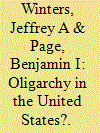

|
|
|
|
|
| Publication |
2009.
|
| Summary/Abstract |
We explore the possibility that the US political system can usefully be characterized as oligarchic. Using a material-based definition drawn from Aristotle, we argue that oligarchy is not inconsistent with democracy; that oligarchs need not occupy formal office or conspire together or even engage extensively in politics in order to prevail; that great wealth can provide both the resources and the motivation to exert potent political influence. Data on the US distributions of income and wealth are used to construct several Material Power Indices, which suggest that the wealthiest Americans may exert vastly greater political influence than average citizens and that a very small group of the wealthiest (perhaps the top tenth of 1 percent) may have sufficient power to dominate policy in certain key areas. A brief review of the literature suggests possible mechanisms by which such influence could occur, through lobbying, the electoral process, opinion shaping, and the US Constitution itself.
|
|
|
|
|
|
|
|
|
|
|
|
|
|
|
|
| 10 |
ID:
105862
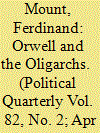

|
|
|
|
|
| Publication |
2011.
|
| Summary/Abstract |
The unique quality of George Orwell's political journalism is to force us to examine not just the utterances of our opponents, but what we say ourselves, in particular how we deceive ourselves as well as deceiving others. What would Orwell diagnose as our major self-deception if he were alive today? Orwell was much taken with James Burnham's 1941 bestseller The Managerial Society. He agreed with Burnham that the predominant drift in modern society was towards oligarchy, and not towards democracy as we like to flatter ourselves. Whether in business or politics, decisions today rest in fewer hands. Power is concentrated, not dispersed. As in Russia, the emerging system enables oligarchs to collar a disproportionate share of the rewards. Management becomes a self-remunerating elite. Inequality of income increases sharply as a result. Oligarchy is a perversion of liberal capitalism and not a natural development of it. It can be reversed. The Coalition government has set out in a liberal and localist direction. It remains to be seen whether these promising signs will develop into a sustained and effective programme.
|
|
|
|
|
|
|
|
|
|
|
|
|
|
|
|
| 11 |
ID:
158536
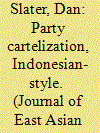

|
|
|
|
|
| Summary/Abstract |
Democracy and opposition are supposed to go hand in hand. Opposition did not emerge as automatically as expected after Indonesia democratized, however, because presidents shared power much more widely than expected. The result has been what I call party cartelization, Indonesian-style. This differs significantly from canonical cases of party cartelization in Europe. Yet it exhibits the same troubling outcome for democratic accountability: the stunted development of a clearly identifiable party opposition. Since the advent of direct presidential elections in 2004, Indonesian democratic competition has unsurprisingly assumed somewhat more of a government vs. opposition cast. But this shift has arisen more from contingent failures of elite bargaining than from any decisive change in the power-sharing game. So long as Indonesia's presidents consider it strategically advantageous to share power with any party that declares its support, opposition will remain difficult to identify and vulnerable to being extinguished entirely in the world's largest emerging democracy.
|
|
|
|
|
|
|
|
|
|
|
|
|
|
|
|
| 12 |
ID:
148548
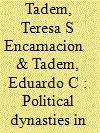

|
|
|
|
|
| Summary/Abstract |
The results of the 2013 Philippine mid-term elections highlighted the dominance of political dynasties in the country. With all 80 provinces littered with political families, 74 percent of the elected members of the House of Representatives came from such dynastic groups. Despite overwhelming recognition that political dynasties breed patronage politics and corruption, no substantial steps have been undertaken to address this issue. This article examines the general nature of Philippine political dynasties, the reasons for their continuing existence and their adverse impact on the country. This problem emanates basically from three factors: (1) the political and socio-economic foundations upon which political dynasties are built; 2) the inability to effectively implement Philippine constitutional provisions by enacting an enabling law; and 3) the weakness of potential countervailing forces that would challenge political dynasties.
|
|
|
|
|
|
|
|
|
|
|
|
|
|
|
|
| 13 |
ID:
143618
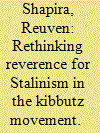

|
|
|
|
|
| Summary/Abstract |
The reverence for Stalinism by the main kibbutz movements, which through revolutionary rhetoric helped perpetuate leaders who had reached the dysfunctional phase, was wrongly interpreted. Historians missed leaders’ efforts to induce reverence and its use for their domination, while social researchers missed its enhancement of oligarchic rule. These are explained by the suppression of critics at the hands of a co-opted functionalist scientific coalition, by ethnographers missing the impact of inter-kibbutz organizations, and by the differentiation of disciplines. Multiple ethnographies of kibbutzim (pl. of kibbutz) and inter-kibbutz organizations and the integration of various findings by a good theory exposed these failures. They point to the required integration of disciplines and to the need for reform of scientific publication decision-making aimed at preventing such failures.
|
|
|
|
|
|
|
|
|
|
|
|
|
|
|
|
| 14 |
ID:
146533
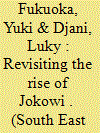

|
|
|
|
|
| Summary/Abstract |
Just a few months into his first term, the new president of Indonesia, Jokowi, began to disappoint his supporters who had expected his presidency to enhance the quality of Indonesia’s dysfunctional democracy.1 Contrary to his campaign promise of establishing a ‘clean’ and ‘professional’ government without horse-trading, Jokowi granted strategic government positions to those with links to oligarchic interests, indicating that key decisions were largely dictated by his party patrons. Much of the literature, which has tended to portray the rise of Jokowi as a challenge to oligarchic interests, is not well placed to account for this ‘U-turn’. Against this backdrop, this article explores another dimension of Jokowi’s ascendance, arguing that it should also be understood in the broader context of oligarchic adaptation of ‘post-clientelist’ initiatives – measures to attract enlightened voters to compensate for increasingly ineffective clientelistic mobilisation. This is not to argue that Jokowi was simply made a ‘puppet’ of his patrons, but to suggest that more attention needs to be directed to the broader structural constraints placed on Jokowi in order to have a more nuanced understanding of the political context in which he must operate.
|
|
|
|
|
|
|
|
|
|
|
|
|
|
|
|
| 15 |
ID:
170129
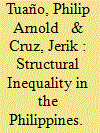

|
|
|
|
|
|
|
|